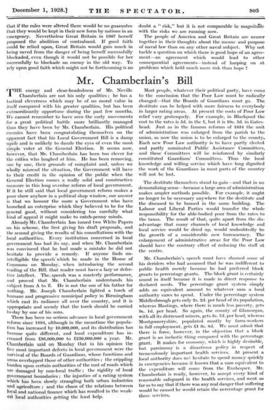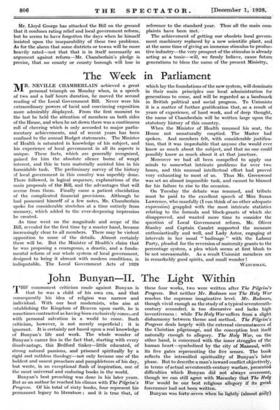Mr. Chamberlain's Bill
THE energy and clear-headedness of Mr. Neville Chamberlain are not his only qualities ; he has a tactical cleverness which may be of no moral value in itself compared with his greater qualities, but has been extraordinarily opportune during the past few months. We cannot remember to have seen the early movements for a great political battle more brilliantly managed than they have been by Mr. Chamberlain. His political enemies have been congratulating themselves on the apparent fact that his Local Government Bill is a damp squib and is unlikely to dazzle the eyes of even the most simple voter at the General Election. It seems now, however,. that Mr. Chaniberlain has been too clever for the critics who laughed at him. He has been removing, one. by. one, their grounds of complaint and, unless we wholly misread the situation, the -Government will have to their "credit in the opinion of the public when the General Election comes a really solid and constructive measure in this long overdue reform of local government. If it be still said that local government reform makes a poor show anyhow in a political shop window, our answer is that we honour the more a Government who have launched an enterprise which they believed to be for the general good, without considering too carefully what kind of appeal it might make to Catch-penny minds.
Already Mr. Chamberlain has issued two White Papers on. his scheme, the first giving his draft proposals, and the second giving the results of his consultations with the local; authorities. Every institution concerned in local government .has had its say, and when Mr. Chamberlain was convinced that he had made a mistake he did not hesitate to provide a remedy. If anyone finds un- intelligible the speech-which he made in. the House of Commons on Monday, when introducing the second reading of the Bill, that reader must have a lazy or defec- tive intellect. The, speech was a masterly performance, and proved that Mr. Chamberlain understands his subject from A to Z. He is not the son of his father for nothing. Mr. Joseph Chamberlain lighted a torch of humane and progressive municipal policy in Birmingham which cast its radiance all over the country, and it is appropriate and seemly that the torch should be carried to-day by one of his sons.
There has been no serious advance in local government reform since 1894, although in the meantime the popula- tion has increased by 10,000,000, and its distribution has become quite different, and local expenditure has in- creased froth '136,060,000 to £250,000,000- a 'year. Mr. Chamberlain said on Monday that in his opinion the five most important defects- in local government were the survival of the Boards of Guardians, whose functions and areas overlapped those of other authorities ; the crippling burden upon certain authorities of the cost of roads which Inc damaged by non-local traffic ; the rigidity of local government boundaries ; the injustice of a rating system -which has been slowly strangling both urban industries and agriculture ; and the chaos, of the relations between local and-national finance which has resulted in the weak, est "local authorities getting the least help. Most people, whatever their political party, have come to the conclusion that the Poor. Law must be radically changed—that the Boards of Guardians must go. The destitute can be helped with more fairness to everybody in larger rating areas. . At present the costs of Poor Law relief vary grotesquely. For example, in Blackpool the cost to the rates is 5d. in the but it is 10s. 5d. in Gates- head. Just as in the famous reforms of 1834 the unit of administration was enlarged from the parish to the union, so now the union is to be enlarged to the county. Each new Poor Law authority is to have partly elected and partly nominated Public Assistance Committees, and these Committees will be reinforced by similarly constituted Guardians' Committees. Thus the local knowledge and willing service which have long dignified the work of the Guardians in most parts of the country will not be lost.
The destitute themselves stand to gain—and that in no demoralizing sense—because a large area of administration makes ampler methods possible. For example, it ought no longer to be -necessary anywhere for the destitute and the diseased to be housed in the same building. The Labour and Liberal Parties would transfer the whole responsibility for the able-bodied poor from the rates to the taxes. The result of that, quite apart from the dis- advantage that many channels of local knowledge and local service would be dried up, would undoubtedly be the growth of a considerable new bureaucracy. The enlargement of administrative areas for the Poor Law should have the contrary effect of reducing the staff at the centre.
Mr. Chamberlain's speech must have shamed some of his deriders who had assumed that he was indifferent to public health merely because he had preferred block grants to percentage grants. The block grant is certainly sound in itself because it is made in direct response to declared needs. The percentage grant system simply adds an equivalent amount to whatever sum a local authority cares to spend. Under the percentage system Middlesbrough gets only 2s. 2d. per head of its population, whereas Hastings, where there is much less poverty, gets 9s. ld. per head. So again, the county of Glamorgan, with all its distressed miners, gets 3s. 7d. per head, whereas Montgomeryshire, populated mostly by farm-workers in full employment, gets £1 3s. 8d. We must admit that there is force, however, in the objection that a block grant is an inelastic thing compared with the percentage grant. It makes for economy, which is highly desirable, but parsimony is a disastrous policy in respect of tremendously important health services. At present a local authority does not hesitate to spend money quickly in emergencies because it knows that a sum equivalent to the expenditure will come from the Exchequer. Mr. Chamberlain is ready, however, to accept every kind of reasonable safeguard in the health services, and went so far as to say that if there was any real danger that suffering would be caused he- would retain the percentage grant for these services. Mr. Lloyd George has attacked the Bill on the -ground that it confuses rating relief and local government reform, but he seems to have forgotten the days when he himself insisted upon the inseparability of these two problems. As for the alarm that some districts or towns will be more heavily rated—not that that is in itself necessarily an argument against reform—Mr. Chamberlain's pledge is precise, that no county or county borough will lose in reference to the standard year. Thus all the main corn. plaints have been Met.' -; The achievement of getting our obsolete local govern- ment machinerY replaced by a new scientific plant, and at the same time of giving an immense stimulus to produc- tive industry—the very prospect of the stimulus is acting as a tonic—will, we firmly believe, cause future generations to bless the name of the present Ministry,









































 Previous page
Previous page